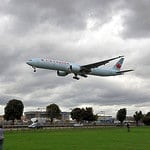Skift Take
From the despised passenger air duty to the row over Heathrow's expansion, it's becoming clear that Britain needs to have a sit-down over its aviation strategy.
I backed Cameron on Heathrow to save the environment – but the facts have changed
What better way to kick-start Britain’s sluggish economy than by boosting trade with China? Perhaps with Chongqing, with 28 million consumers, many enjoying rising incomes. Or Chengdu, with 14 million. Or how about Wuhan, with 10 million? We could not only boost exports – we currently sell more to Ireland than to China, whose population is 250 times bigger – but might also tap into the bulging coffers of the Chinese for some job-creating investment in Britain.
There’s just one problem: you can’t fly directly to those three cities. Getting to and from China is harder from Britain than from our competitors. Frankfurt and Charles de Gaulle fly twice as many flights to twice as many destinations as Heathrow. The problem is so acute that the Chinese government is pressing for more slots at our flagship airport.
As John Cridland, the head of the CBI, puts it, “every day, the UK is losing out to its European rivals on new routes to growing markets”. “The lamentable failure to increase airport capacity means that jobs are already being lost to our competitors,” adds Simon Walker of the Institute of Directors. On the union side, Len McCluskey of Unite says: “It is madness to think that the UK can muddle on without a top-quality hub airport. Heathrow is perfectly positioned to fulfil that role.”
In June 2008, David Cameron – anxious to make the Conservatives greener and help detoxify their brand – announced his opposition to expanding Heathrow. At the time, I strongly supported the party line, because more runways meant more flights and therefore increased carbon emissions.
But the world was very different then. China’s economy was barely two thirds of its present size, and other Asian tigers were much smaller, too. Now, not only are our competitors stealing a march on us, but we also need to modernise our transport infrastructure – and where better to start than with the third runway at Heathrow?
Unlike other big projects, this doesn’t involve going to the Treasury with a begging bowl – in contrast to Boris Island, which would cost taxpayers a fortune, is on the wrong side of London, and couldn’t open until after the rest of Europe had secured the markets and investment on which our future prosperity depends.
Some opponents of the idea say we should develop other London airports instead – but air travellers don’t like transferring across cities. When you fly to New York, you don’t take a taxi from Kennedy to Newark to get your connection.
Since the whole cost will be borne by the private sector, thousands of jobs created and the construction industry boosted, what’s holding a third runway up? The Prime Minister is, I suspect, nervous of being attacked for another U-turn. But this isn’t a tax wheeze unveiled on Budget Day and consigned to the dustbin before Whitsun. It is an evidence-based reappraisal of a transport infrastructure that looks increasingly Third World compared with much of Asia – and a recognition that we need more airport capacity in this decade, not the 2030s.
The environmental objections are disappearing, too. Last January, greenhouse gas emissions from flying were brought within the EU cap. Indeed, we could cover the whole of Surrey with runways and not increase emissions by a single kilogram: if Heathrow expands, so remaining the European destination of choice, airlines will fly their newest and quietest aircraft to it. If not, then older and noisier planes will be the norm.
Unveiling this policy now would seize the political initiative, and could be the start of a desperately needed programme to make Britain the most business-friendly country in Europe. That would enable us to remain in the economic Premier League and allow our children to enjoy the rising living standards that today’s decision-makers took for granted when growing up.
With investment more mobile than ever before, only those nations with modern, efficient transport, energy and IT infrastructures will attract it. And with global competition intensifying, only economies with low income tax rates – personal and corporate – and genuinely light regulation will attract business.
Our history, our environment, our culture, our great cities – plus the happy combination of the English language with our geographical position – give us that opportunity. The success of the Olympics should give us the confidence. So the Prime Minister must ask himself whether he is man or mouse. His place in history is assured as the leader who made the Tories (nearly) electable again, an achievement that eluded three previous leaders. But does he want to be another Harold Macmillan, presiding over a dignified slide towards insignificance? Or is there somewhere inside his heart – an organ that still remains impenetrable to most Britons – a trace of Thatcher, determined to reverse the direction of our ship?
An immediate go-ahead for a third runway will symbolise the start of a new era, the moment the Cameron government found its sense of mission. Let’s go for it.
Tim Yeo is Conservative MP for Suffolk South and chairman of the Energy and Climate Change Select Committee. ![]()
The Daily Newsletter
Our daily coverage of the global travel industry. Written by editors and analysts from across Skift’s brands.
Have a confidential tip for Skift? Get in touch

